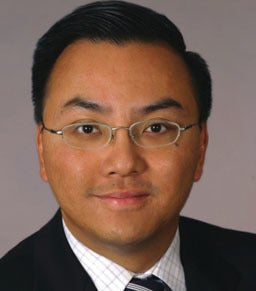
Joseph Chan
CHIEF LEGAL OFFICER
YUM CHINA SHANGHAI, CHINA
If the opportunity to head the legal department at a company that runs one of the most iconic western consumer brands in China didn’t arise last year, Joseph Chan would likely be thinking about how to spend his retirement after a successful career as a partner in a major US law firm. Instead, he says he feels like he is embarking on a new career as chief legal officer of Yum China, the largest restaurant group in China, which includes KFC and Pizza Hut operations there, as well as Chinese dining brands such as Little Sheep and emerging brands like Lavazza, manned by one of the world’s largest workforces of 400,000 employees as of the end of June 2020. The company, which is incorporated in Delaware and listed on the New York Stock Exchange (NYSE), presents a rare set of legal challenges with practically all its operations on one side of the world, China, and its primary governance and most of its investors on the other, the United States. “The ‘g’ in ‘general counsel’ takes on new meaning now that I’m living it!” he exclaims.
When he was initially approached for the head legal role, the recruiter handed him the job description, which was nearly five pages long, single-spaced. The unique structure of Yum China, which was spun off from Yum! Brands (owner of the KFC, Pizza Hut, and Taco Bell brands in the United States) in 2016, with its governance rooted in US laws, and customers and employees in China, meant that the list of candidates who had the legal knowledge and the business and language skills to bridge the divide was small. “There are probably half a dozen people in the world who could fill this position, and I know most of them,” Chan says, laughing. He was attracted to a company that had one foot in the West and one foot in the East, mirroring his career.

Yum China
In 1987, Yum China opened its first KFC outlet in the hallowed capital city of Beijing, making KFC the first Western chain restaurant to come to China. For nearly 30 years, Yum China was a subsidiary of Yum! Brands.
Chan breaks down the hybridization between the US and Chinese aspects of the company. Yum China is a domestic issuer on the NYSE, so it must be cognizant of all applicable US laws; in particular, knowledge and experience of US corporate (Delaware) and Federal securities laws is critical.
At the same time, nearly all of its business — and its employees — are in China. As a publicly listed Fortune 500 with multiple consumer brands serving food every day, everything the company does is scrutinized by the media, the public, and government regulators. To succeed, Chan must be intimately familiar with the Chinese legal and regulatory landscape, as well as speaking the language and knowing the cultural and business environment in the current macro context.
“It means that you can never think from just one perspective,” Chan says.
More tech than chicken
Yum China’s board reflects its unique position in the world, with directors hailing from both the United States and Greater China. The diversified board includes seasoned executives from Fortune 500 and the investment banking, venture capital, and technology industries. One of the more surprising aspects of Yum China, however, is that almost half of the C-suite executives come from a tech background. “My first week at Yum China, I thought I had joined a tech company,” Chan jokes.
Erecting an enterprise-wide digital platform has been a strategic priority of Yum China over the last few years. Visiting a KFC in China is an experience of technology serving the customer. The AI-enabled menu and ordering system help serve customers better; approximately 80 percent of orders are digital orders and 90 percent of payments are cashless. Data from the company’s 265 million customers is analyzed for broader patterns to enhance customer experience and engagement.
Restaurant managers, almost all of whom hold college degrees, and are the backbone of the company, Chan emphasizes, wear smart-watches so they can instantly assess inventory and staffing needs and respond in real-time. Temperature in the company’s refrigerated trucks across the country is monitored around the clock in its centralized digital services center to maintain food safety protocols.
Because the business is so digitally driven, his legal department also needs to be. Chan is seeking to transform his legal department to be a leader in legal ops in China, among other aspirations. “There is tremendous opportunity here to tap into what legal tech has to offer,” he says. Yum China has thousands of contracts with hundreds of suppliers and vendors. And every employee — and there are almost half a million of them — is subject to labor laws.
Chan sees potential for a robust, intelligent contract management system that can handle the enormous operations of the company.
Chan is eagerly learning about his new in-house role. He’s found that the vast majority of his time does not involve advising on the law per se. “I think about talent management and keeping an eye on the competitive forces out there and the strategy of the overall enterprise,” he says. He’s enjoying the learning process, even enrolling in a comprehensive senior executive leadership development program at HBS to speed things up.
Getting to know… Joseph Chan
OUTSIDE OF WORK, WHAT ARE YOUR PASSIONS?
I’m a bit of a history buff. I love history, especially antiquity, classical, European, and Chinese history. I also enjoy arts, particularly European classical and romantic paintings. My passions for history and arts also coincide with my interests in travels. For example, before a recent visit to Istanbul, I read a variety of books on the Byzantine and Ottoman empires, along with historic travelogues on the city. Such background reading with a deep-dive into aspects of history greatly enriched my experience when I visited Istanbul. That said, in spite of all that I had read about the Hagia Sophia, the moment I stepped into the famed building was still breathtaking: the sheer wonder of the architecture; the sublime beauty of the mosaic….
WHAT ADVICE DO YOU HAVE FOR AN IN-HOUSE LAWYER WHO MUST WORK ACROSS CULTURES?
Having language proficiency is important and goes a long way bridging any cultural divide. However, culture goes beyond language. There are nuances in concepts and social norms and behavior that can only be appreciated by acute observation and disciplined sensitivity. The ability to successfully function in a different cultural setting does not come overnight. Be open to learning about other cultures. Make friends. Immerse yourself in the daily routines of the local peoples. Try to understand their histories. And, most of all, one can’t take anything for granted. A concept may be rudimentary to you, but to others it may well be profoundly alien, and vice versa.
Beginnings
Chan was born and raised in Hong Kong. As a child, he always envisioned becoming a lawyer, even as other children dreamed of becoming a superhero. “Looking back, I had a notion of the law, even though I didn’t really know what the profession was all about,” he reflects.
At 16, he went to boarding school in Hawaii. “Coming from the business metropolis of Hong Kong, Hawaii was a paradise with the sand and balmy weather,” Chan remembers. But before too long, he developed island fever and journeyed to the mainland for undergrad studies at the University of Pennsylvania in Philadelphia, obtaining two bachelor degrees in four years — a bachelor of arts in international relations and a bachelor of science in economics from Wharton. Law school, at the George Washington University, brought him to Washington, DC, and a job offer landed him in San Francisco.
During his time in private practice, he counseled major corporations like Bank of America and Chevron, as well as a variety of tech companies in Silicon Valley. He lived through the tech bubble of the late 1990s and early 2000s. “I saw the incredible run-up and the carnage afterwards, firsthand,” he says of the time.
Back to Asia
In 2006, he was tapped to open the Shanghai office of Pillsbury Winthrop Shaw Pittman LLP and served as its inaugural managing partner. He convinced his family to try the three-year commitment, not realizing that it would turn into a rather long-term stint given the dynamics and opportunities in the market in China. While trained as a US big firm lawyer, with deep background in US corporate securities laws, practicing in China ultimately required Chan to rely as much if not more on his cultural acuity and judgment to assist clients, as the laws were still being written and constantly evolved.
Chan relished practicing in Shanghai. He joined Sidley Austin LLP in 2010 as a partner, and continued his practice counselling Fortune 500 companies, private equity, hedge, and sovereign wealth funds, and major Chinese enterprises. The experience advising both Western and Chinese clients made him a natural fit for his first, challenging yet exciting GC role.
Epilogue
Under Chan’s leadership, working closely alongside Yum China’s CEO and CFO, the company successfully achieved a secondary listing on the Hong Kong Stock Exchange on September 10, 2020, raising over US$2 billion. The company’s secondary listing broke many new grounds and accomplished many firsts. For example, it was the first Fortune 500 to list in Hong Kong, the first Delaware company to list in Hong Kong, and the first non-TMT company to qualify as an “innovative” company under the new Chapter 19C of the Hong Kong listing regime. (All three companies that qualified under 19C and listed were tech behemoths in China — Alibaba, NetEase, and JD.)
ACC EXTRAS ON… Tech for GCs
ACC Docket
AI for GCs: What You Need to Know as Your Company Adapts (March 2019).
The Age of AI: How Will In-house Law Departments Run in 10 Years? (Aug. 2019).
The Rise of Artificial Intelligence and its Impact on General Counsel (Aug. 2018).
ACC HAS MORE MATERIAL ON THIS SUBJECT ON OUR WEBSITE. VISIT WWW.ACC.COM, WHERE YOU CAN BROWSE OUR RESOURCES BY PRACTICE AREA OR SEARCH BY KEYWORD.



